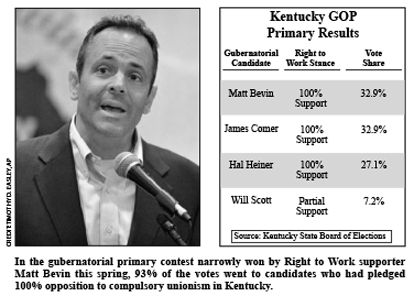Will Team Biden Weaponize Workers’ Pensions?
Big Labor abuse of worker pension and benefit funds as a means of advancing union bosses’ self-aggrandizing policy objectives is a familiar phenomenon.
Clear Contrast Between Gubernatorial Nominees on Forced Unionism
(Source: July 2015 National Right to Work Committee Newsletter)
After a hard-fought primary contest in which 93% of the votes went to candidates who had pledged to support efforts to make Kentucky America’s 26th Right to Work state, in May businessman Matt Bevin captured the GOP nomination for the Bluegrass State governorship.
 With current Big Labor Gov. Steve Beshear (D) barred by Kentucky law from seeking a third term, the state’s highest elective office is up for grabs this fall.
With current Big Labor Gov. Steve Beshear (D) barred by Kentucky law from seeking a third term, the state’s highest elective office is up for grabs this fall.
In November’s general election, Mr. Bevin will be vying for votes with union boss-backed Democrat nominee Jack Conway. Mr. Conway is currently Kentucky’s attorney general and a virulent opponent of Right to Work protections for employees in his state.
An overwhelming majority of the Kentucky Senate has already gone on the record in support of a statewide law sharply curtailing Big Labor’s forced-unionism privileges. And Right to Work support continues to grow in the state House as well.
Therefore, retaining control over the governorship may be the only realistic way for Bluegrass State union officials to protect their forced-unionism privileges in 2016 and 2017.
“For years, scientific polls have shown that the vast majority of Kentuckians agree that the individual employee’s freedom to join or not join a union should be equally protected under the law,” said Greg Mourad, vice president of the National Right to Work Committee.
Kentucky’s 10-Year Real Compensation Growth: Only 15% of Right to Work Average
“Just last year, a poll sponsored by WKYT-TV in Lexington, WHAS-TV in Louisville, and the principal newspapers in the same cities found registered voters support Right to Work by a two-to-one margin,” Mr. Mourad continued.
“Unfortunately, the status quo in Kentucky is fundamentally unfair and contrary to what the public favors.
“It’s illegal under all circumstances for employers to fire employees for joining and/or financially supporting a union. But current policy authorizes and encourages employer/union-boss pacts to fire employees who refuse to support financially a union they would never join voluntarily.”
Mr. Conway and other apologists for forced-unionism workplace schemes in Kentucky find it hard to explain why, in principle, the right not to support a union is less deserving of legal protection than the right to join.
That’s why they frequently insinuate that, however good the Right to Work laws now on the books in 25 states may seem from a moral perspective, enacting such a law would somehow hurt Kentucky’s economy.
But the facts just get in their way. States that already have Right to Work laws benefit economically from prohibiting forced union dues and fees.
For example, from 2004 to 2014, private-sector outlays for employee wages, salaries, and bonuses and noncash compensation grew by an inflation-adjusted 15.3% in the 22 states that had Right to Work laws on the books for the whole decade.
That’s nearly seven times as much real private-sector compensation growth as Kentucky experienced over the same period, and nearly double the real compensation growth in forced-unionism states as a group.
Trying to ‘Split the Difference’ on Right to Work Not a Viable Strategy
“The best reason for candidates in Kentucky to take strong public stances in support of Right to Work is that forced unionism is just plain wrong,” said Mr. Mourad.
“Candidates who are tempted to sit on the fence should also be aware of the electoral history showing that unabashed advocacy for the Right to Work is politically smart.”
The recent Kentucky gubernatorial primary is a case in point, Mr. Mourad added.
After receiving candidate surveys from the Frankfort-based, grass-roots Kentucky Right to Work Committee, Mr. Bevin, James Comer, and Hal Heiner pledged to support passage of a strong, statewide Right to Work law.
Respectively, they received 70,479, 70,396 and 57,948 votes in the Republican primary.
Meanwhile, a fourth candidate, Will Scott, opposed a statewide Right to Work law and said he would back Right to Work only at the local level. He received 15,364 votes.
Mr. Mourad concluded: “The vast majority of Kentuckians and other Americans support Right to Work. A small minority are opposed. But there is no constituency in any state for Right to Work half-measures only.

Big Labor abuse of worker pension and benefit funds as a means of advancing union bosses’ self-aggrandizing policy objectives is a familiar phenomenon.

Leaked CTU Proposals Won’t Do Anything to Improve Schools’ Poor Performance

What impact does handing a union monopoly power to deal with your employer on matters concerning your pay, benefits, and work rules have on your pay?